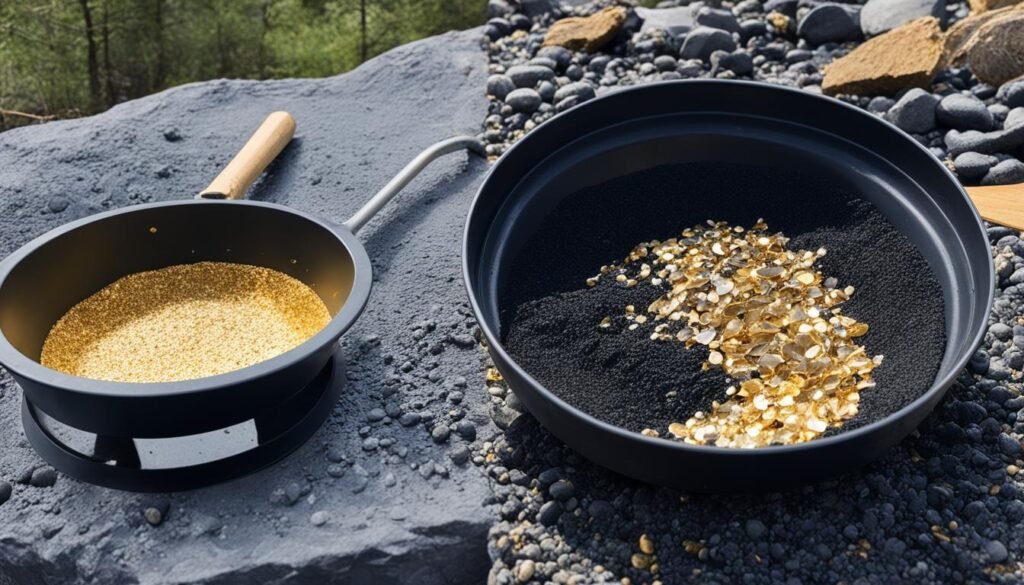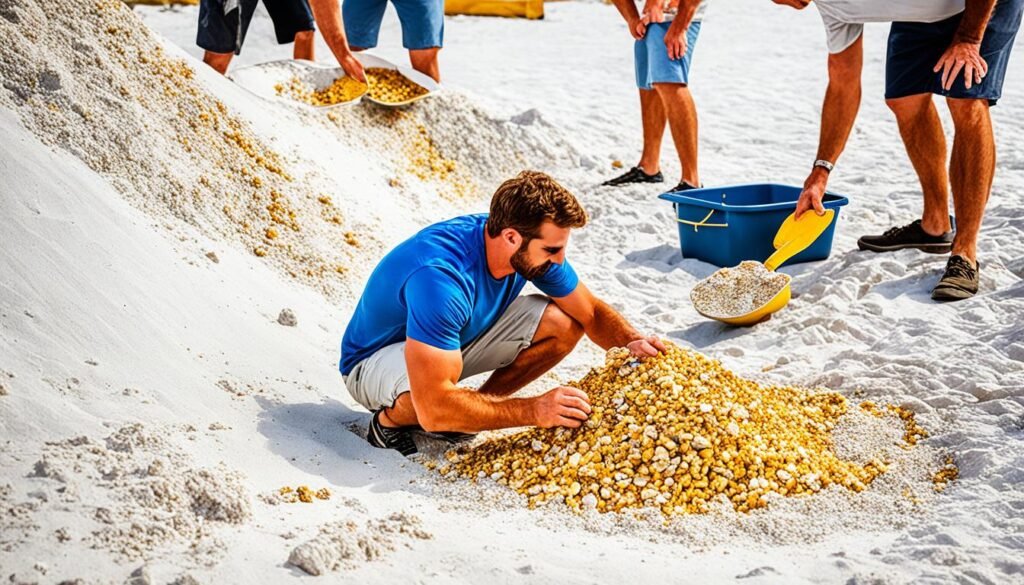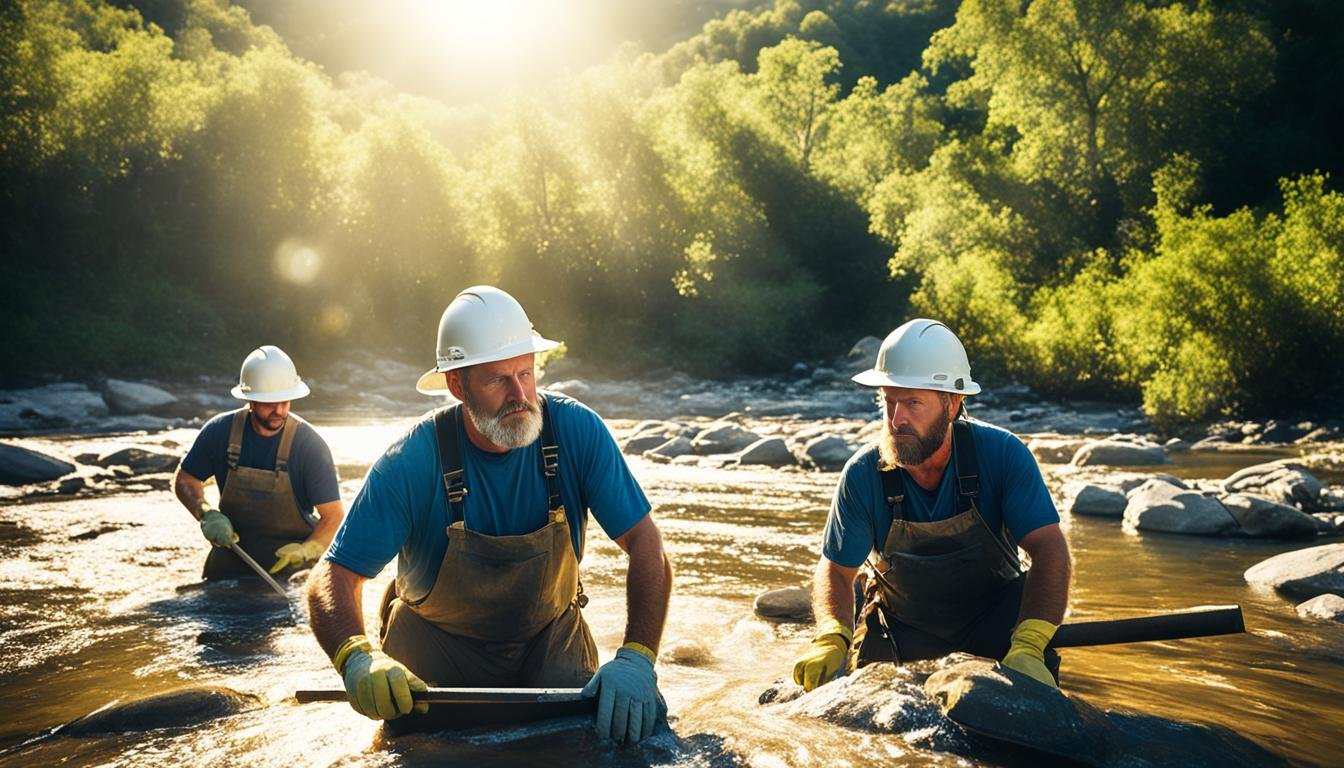Have you ever wondered if there is gold to be found in the sunshine state?
While Florida may not have the same reputation as gold-rich states like California or Alaska, the state holds its own hidden treasures waiting to be discovered. Contrary to popular belief, gold can indeed be found in Florida, but not in the form of natural deposits.
So, how can you uncover these elusive treasures and embark on your own gold mining adventure in Florida?
Key Takeaways about Gold Mining in Florida
- Gold can be found in Florida through metal detecting and beachcombing, rather than natural deposits.
- Understanding Florida’s unique geology and geography is essential for successful gold mining.
- Florida has a rich history of hidden treasures, including lost Spanish galleons and shipwrecks along the Gulf of Mexico.
- Metal detecting and beachcombing offer exciting opportunities for modern-day treasure hunters in Florida.
- Navigating the legal aspects and environmental impacts of gold mining is crucial for responsible prospecting.
Join us as we delve into the world of gold mining in Florida, where we will explore the unique opportunities that the state offers to modern-day treasure hunters. From metal detecting to beachcombing, we will uncover the geology of Florida, its intriguing historical prospects, legal considerations, equipment essentials, and other valuable finds beyond gold.
Get ready to uncover the possibilities and embark on an adventure like no other!
The Geology of Florida: Understanding the Landscape
Florida’s unique geology poses challenges for gold mining. The majority of the state was once covered by water, leading to the formation of limestone deposits over millions of years. While gold is not naturally found in these limestone formations, Florida’s geology offers other opportunities for prospectors, such as fossilized coral and shark teeth.
Limestone Formations and the Absence of Natural Gold Deposits
Unlike gold-bearing states, such as California or Alaska, Florida does not have natural gold deposits embedded in its geology. The state’s geology primarily consists of limestone formations that were formed underwater. These formations were created over millions of years from the accumulation of marine shells and coral reefs. While gold may not be present in these limestone formations, they offer a glimpse into Florida’s ancient aquatic past and provide opportunities for fossil and artifact discoveries.
How Florida’s Geography Differs from Traditional Gold-Bearing States
Florida’s geography sets it apart from traditional gold-bearing states. Instead of having mountains or rivers where gold can be found, Florida’s landscape is characterized by its unique coastline, wetlands, and extensive system of lakes. The diverse ecosystem of Florida offers a different type of treasure hunting where prospectors can search for valuable artifacts, buried treasures, and even modern-day treasures washed up on the shores.
Table: Comparison of Florida’s Geology with Traditional Gold-Bearing States
| Aspect | Florida | Traditional Gold-Bearing States |
|---|---|---|
| Geological Composition | Limestone formations | Mountains, rivers, and alluvial deposits |
| Primary Treasure | Fossilized coral, artifacts, shark teeth | Natural gold deposits |
| Prospecting Methods | Metal detecting, beachcombing | Gold panning, sluicing, dredging |
| Main Challenges | Adapting to unique geology, finding historical treasures | Identifying gold-rich areas, gold extraction techniques |
Historical Prospects: Florida’s Gold Mining Past and Present
Florida’s gold mining history is deeply rooted in the influence of Spanish explorers and the allure of buried treasures. The state’s rich heritage is filled with legends of lost Spanish galleons and captivating stories of shipwrecks along the Gulf of Mexico. While traditional gold mining may not have played a significant role in Florida’s history, the state’s historical prospects offer a fascinating glimpse into its past and hold great potential for modern-day treasure hunting.
Spanish explorers, such as Juan Ponce de León, played a pivotal role in Florida’s early encounters with gold. They sought wealth and treasures, leaving behind a trail of mysteries and hidden riches waiting to be unearthed. From tales of buried treasures to the remnants of Spanish colonial expeditions, Florida holds the remnants of a bygone era that continue to ignite the imagination of gold and treasure hunters.
The Gulf of Mexico has also witnessed numerous shipwrecks throughout history, acting as a final resting place for sunken riches. Florida’s coastline has become an intriguing spot for avid treasure hunters, each shipwreck promising the possibility of discovering lost treasures, artifacts, and submerged gold. The secrets of the Gulf of Mexico continue to captivate adventurers and inspire countless expeditions in search of hidden fortunes.
Buy Gold Online: The Smart and Secure Way
Discover the safest and most reliable strategies to buy gold online. Make informed investment decisions and secure your financial future today!
Learn More
Exploring the stories of Spanish explorers and the tales of shipwrecks along the Gulf of Mexico not only piques our curiosity but also offers valuable insights for gold and treasure hunters in Florida. These historical prospects provide a unique lens through which we can uncover the hidden treasures concealed within Florida’s vibrant history. Whether it be a sunken galleon or a lost artifact, the possibilities for discovery are limitless in this adventurous pursuit of Florida’s golden past.
Modern-Day Treasure Hunting in Florida
Modern-day treasure hunting in Florida offers an exciting twist to traditional gold panning. While gold deposits may not be abundant, there are still numerous opportunities to uncover hidden treasures and valuable artifacts in the Sunshine State.
Metal Detecting: Florida’s Alternative to Gold Panning
Metal detecting has gained popularity as an alternative method for treasure hunting in Florida. With a metal detector in hand, you can explore various terrains, including parks, fields, and forests, in search of ancient coins, jewelry, and other valuable relics from the past.
Florida’s rich history and diverse cultural influences make metal detecting an exciting and rewarding activity. From Spanish colonial coins to Civil War artifacts, the state’s long history provides ample opportunities for metal detector enthusiasts to unearth remarkable treasures.
Beaches and Beyond: Finding Lost Gold in the Sand
Florida’s stunning coastal areas offer treasure hunters a unique opportunity to find lost gold and valuables. Due to its strategic location, the state’s coastline has witnessed numerous shipwrecks and maritime incidents throughout history.
By combing the sandy beaches with a metal detector, you can discover items lost at sea centuries ago. Gold coins, jewelry, and other artifacts from shipwrecks have been washed ashore, waiting to be discovered by avid beachcombers.
Whether you choose to snorkel in the crystal-clear waters of the Florida Keys or explore the shores of the Atlantic or Gulf of Mexico, the beaches hold the promise of finding lost gold and treasures.
Modern-day treasure hunting in Florida is an adventure brimming with excitement and the potential for extraordinary discoveries. From metal detecting in diverse terrains to beachcombing for lost gold, the Sunshine State offers endless possibilities for treasure hunters to indulge in their passion.
Gold Mining in Florida: Legal Considerations and Restrictions
Navigating Land Ownership and Mining Rights in Florida
When engaging in gold mining activities in Florida, it is crucial to understand the legal considerations and restrictions that come with it. Navigating land ownership and mining rights is essential to ensure compliance with regulations and to avoid trespassing on private properties.
In Florida, land ownership can be a complex issue, with a mix of public lands, private properties, and protected areas. Before starting any mining operations, it is important to determine the ownership of the land and obtain the necessary permissions. This can involve researching property records, contacting landowners, or seeking guidance from local authorities.
Additionally, understanding mining rights in Florida is crucial. Mining rights pertain to the permissions required to conduct mining activities on specific lands. These rights may vary depending on the type of land, such as federal, state, or private. It is essential to familiarize yourself with the applicable regulations and obtain the appropriate permits before commencing any mining operations.
Environmental Impacts and Regulatory Compliance for Prospecting
Responsible gold mining in Florida requires a thorough understanding of the environmental impacts associated with prospecting and compliance with regulatory requirements. Mining activities can have significant effects on the surrounding ecosystem, including water quality, habitat disturbance, and soil erosion. To ensure sustainable and environmentally-conscious mining practices, prospectors must take the necessary steps to mitigate and minimize these impacts.
Regulatory compliance is essential in gold mining to ensure the protection of natural resources and comply with state and federal laws. These regulations may include limitations on mining practices, restrictions on certain areas, and requirements for reclamation and restoration of mined lands. Prospectors must familiarize themselves with the applicable regulations, obtain the necessary permits, and follow best practices to ensure compliance with environmental standards.
By navigating land ownership, understanding mining rights, considering environmental impacts, and complying with regulatory requirements, prospectors can engage in responsible and legally compliant gold mining in Florida.
Equipment Essentials for Gold and Treasure Hunters in Florida
Successful gold and treasure hunting in Florida requires the right equipment. This section will delve into the essentials that every prospector should have, including metal detectors and dry-washing tools. Choosing the right equipment can greatly enhance the chances of finding gold and other valuable treasures in Florida’s terrain. From understanding the different types of metal detectors to learning the techniques of dry-washing, this guide will equip prospectors with the knowledge needed to maximize their success.

Metal Detectors: Uncover Hidden Treasures
To effectively search for gold and valuable items, a reliable metal detector is essential. There are various types of metal detectors available, each with its own capabilities and features.
Here are some popular options:
- Single-Frequency Metal Detectors: These detectors are versatile and suitable for general-purpose prospecting. They work by emitting a single frequency to locate metal objects.
- Pulse Induction Metal Detectors: Ideal for beachcombing and searching for deeply buried items, pulse induction detectors are highly sensitive and can penetrate mineralized ground.
- Multi-Frequency Metal Detectors: These detectors offer the best of both single-frequency and pulse induction detectors. They can switch between frequencies to enhance target identification and discrimination.
Understanding the functions and capabilities of different metal detectors will help you choose the right one for your prospecting needs in Florida’s diverse terrain.
Dry-Washing Tools: Extract Gold Effortlessly
In areas with limited water sources or where water regulations restrict the use of traditional sluicing and panning methods, dry-washing tools offer an effective alternative for extracting gold. Dry-washing utilizes air blowing techniques to separate gold from lighter materials such as sand and gravel.
Here are some essential dry-washing tools:
- Dry-Washers: These machines use a combination of air and vibration to separate gold particles from other materials. Lightweight and portable dry-washers are ideal for prospecting in remote areas.
- Classifier Screens: These screens help to separate different sizes of materials during the dry-washing process, allowing for more efficient gold recovery.
- Crevice Tools: Perfect for extracting gold deposits trapped in hard-to-reach cracks and crevices, crevice tools are essential for thorough prospecting.
Equipping yourself with the right dry-washing tools will enable you to effectively extract gold in dry and arid regions of Florida.
Gold Mining in Florida: The Facts vs. the Fiction
When it comes to gold mining in Florida, there are numerous myths and misconceptions that can cloud the truth. It’s important to separate fact from fiction to have a realistic understanding of the state’s gold prospecting potential. While Florida may not boast the same abundance of natural gold deposits as other states, there are still opportunities for amateur and recreational prospectors to enjoy the thrill of the hunt.
Debunking Myths About Florida’s Gold Prospecting Potential
Myth #1: Florida has no gold at all. This is not entirely true. While it’s true that Florida lacks significant natural gold deposits, the state still offers opportunities for finding gold through different means, such as metal detecting and beachcombing. The key is to adjust your expectations and approach.
Myth #2: Florida’s gold is low in value and not worth the effort. While Florida’s gold may not be as abundant as in other states, it can still hold value. Additionally, the thrill of the hunt and the excitement of discovering hidden treasures make gold mining in Florida a rewarding experience, regardless of the monetary value.
Myth #3: Florida’s gold prospecting potential is limited to small specks of gold. While larger gold nuggets are rare in Florida, prospectors can still find small specks of gold, along with other valuable treasures like ancient coins and artifacts. The key is to focus on different techniques and areas where gold and other treasures are more likely to be found.
Realistic Expectations for Amateur and Recreational Prospectors
As an amateur or recreational prospector in Florida, it’s essential to set realistic expectations. Here are some key points to keep in mind:
- Understand that Florida’s gold mining opportunities are different from those in gold-rich states. Instead of traditional mining, you’ll need to explore alternative methods like metal detecting and beachcombing.
- Focus on historical areas and locations where significant treasure finds have been documented, such as beaches known for shipwrecks and areas with a rich history of Spanish exploration.
- Invest in quality equipment, such as metal detectors specifically designed for gold prospecting. Having the right tools can greatly improve your chances of success.
- Enjoy the process of treasure hunting and the beauty of Florida’s landscapes. The real value lies not only in the gold you find but in the experience and enjoyment of the journey itself.
By understanding the realities of gold mining in Florida and managing your expectations, you can set yourself up for a fulfilling and enjoyable prospecting experience.

Comparing Florida to Gold-Rich States: What Makes Them Different
Comparing Florida to gold-rich states can provide valuable insights into what makes them different. While Florida may not have the same abundance of natural gold deposits, it offers unique opportunities for prospectors and treasure hunters.
By exploring the successful gold-bearing regions of Georgia and Alabama, we can gain insights into the geological factors that contribute to their abundance of gold deposits. Additionally, lessons from gold panning on the West Coast and gold mining in Alaska can offer prospectors in Florida valuable knowledge and techniques to enhance their own prospecting endeavors.
Insights into the Successful Gold-Bearing Regions of Georgia and Alabama
To understand the differences between Florida and gold-rich states like Georgia and Alabama, it’s important to explore the geological factors that contribute to their gold-bearing regions. Georgia, known as the “Empire State of the South,” has a long history of gold mining, with major deposits found in the northwestern part of the state. The gold in Georgia is primarily found in quartz veins and is known for its high purity.
Alabama, on the other hand, is home to the famous Tallapoosa Gold Belt, a region known for its extensive gold deposits. The gold in Alabama is generally found in quartz and placer deposits, making it accessible to recreational prospectors.
Adventures in Gold Panning: Lessons from the West Coast and Alaska
While Florida may not have the same level of gold mining activity as the West Coast and Alaska, there is still much to learn from the experiences of prospectors in these regions. The West Coast, particularly California, has a rich history of gold mining, with large-scale industrial operations and abundant placer deposits. Gold panning on the West Coast can teach prospectors valuable techniques and approaches to maximize their success.
Alaska, often referred to as the “Last Frontier,” is synonymous with gold mining. The state has been a hotbed for gold exploration and mining since the Klondike Gold Rush. The challenges and rewards of gold mining in Alaska can provide valuable insights for prospectors in Florida, helping them navigate the unique terrain and climate.
From Gold to Gems: Other Valuable Finds in Florida’s Terrain
While gold may not be abundant in Florida, the state offers other valuable finds in its terrain. This section will explore Florida’s gemstone wealth and its status as a destination for fossil hunters.
A Close Look at Florida’s Gemstone Wealth
Florida is home to a diverse range of gemstones that can be found in various locations across the state. One notable gemstone is agatized coral, which forms when silica-rich groundwater replaces the coral’s original organic material. The result is a stunning display of vibrant colors and intricate patterns, making agatized coral a sought-after gemstone among collectors and jewelry enthusiasts.
Calcite crystals are another gemstone that can be discovered in Florida. These beautiful, translucent crystals are often found in limestone caves and formations, adding a touch of natural beauty to the state’s landscape.
Drusy quartz is yet another gemstone that can be found in Florida’s terrain. This unique gemstone is characterized by its sparkling crystals that cover the surface of rocks and minerals, creating a mesmerizing effect. The drusy quartz found in Florida comes in various colors, including white, blue, and purple, making it a versatile and eye-catching addition to any gemstone collection.
These are just a few examples of the gemstones that lie waiting in Florida’s terrain. Whether you’re a gem enthusiast or simply appreciate the beauty of natural gemstones, exploring Florida’s gem mining opportunities can be a rewarding and enriching experience.
Destination for Fossil Hunters: Uncovering Prehistoric Remains
Florida’s rich history and unique geology make it a prime destination for fossil hunters. The state’s terrain holds a wealth of prehistoric remains, offering a glimpse into ancient marine life that once inhabited the area.
Among the most sought-after fossils are the remains of ancient sharks that once roamed Florida’s waters. Fossilized shark teeth can be found along the state’s coastal areas, particularly in locations where ancient shark populations were abundant. These teeth come in various shapes and sizes, with some dating back millions of years. As you uncover these prehistoric remains, you become a part of Florida’s rich natural history.
But it’s not just shark teeth that can be found in Florida. Fossil hunters also have the opportunity to discover other prehistoric marine life, such as the remains of ancient corals, mollusks, and crustaceans. These fossils provide valuable insights into the biodiversity of the region millions of years ago.
Exploring Florida’s fossil-rich terrain is not only a thrilling adventure but also an opportunity to contribute to the scientific understanding of prehistoric life. Whether you’re a seasoned fossil hunter or a novice enthusiast, Florida’s vast selection of prehistoric remains is sure to captivate your interest and ignite your sense of wonder.
Conclusion
In conclusion, gold hunting in Florida may not yield natural gold deposits like other gold-rich states. However, the real treasures lie in the unique experience and enjoyment it offers. While searching for gold, you have the opportunity to explore Florida’s diverse terrain, uncover historical artifacts, and discover the state’s hidden gems. The thrill of the hunt and the joy of finding treasures, whether they be ancient coins, fossilized remains, or beautiful gemstones, make gold prospecting in Florida a truly rewarding adventure.
Looking ahead, the future of gold prospecting in the sunshine state holds both hopes and hurdles. As technology continues to advance, prospectors can benefit from innovative equipment and techniques that enhance the chances of finding treasures. However, it’s important to adapt to the changing landscape of regulations and environmental considerations. Despite its challenges, the allure of gold hunting in Florida remains strong, and with the right mindset and approach, future prospectors can continue to enjoy this fulfilling pursuit.
In summary, gold mining in Florida may not have the same reputation as other states, but it offers a unique and enjoyable prospecting experience. While the focus may not solely be on gold, the treasures you’ll uncover, the memories you’ll create, and the knowledge you’ll gain make it a worthwhile endeavor. So grab your metal detector, explore Florida’s beaches and landscapes, and embark on an adventure where the real treasures lie in the experience itself.
FAQ about Gold Mining in Florida
What is the geology of Florida and its connection to gold mining?
The majority of Florida was once covered by water, leading to the formation of limestone deposits. While gold is not naturally found in these limestone formations, Florida’s geology offers other opportunities for prospectors, such as fossilized coral and shark teeth.
What is the historical significance of gold mining in Florida?
Florida’s gold mining history is intertwined with the influence of Spanish explorers and the lure of buried treasures. The state has a rich history of hidden riches, from legends of lost Spanish galleons to tales of shipwrecks along the Gulf of Mexico.
Is gold panning the only method of treasure hunting in Florida?
No, modern-day treasure hunting in Florida goes beyond traditional gold panning. Metal detecting has become a popular alternative, allowing prospectors to uncover hidden treasures, including ancient coins and valuable artifacts. Beaches also offer a unique opportunity for finding lost gold in the sand.
What are the legal considerations for gold mining in Florida?
Navigating land ownership and mining rights is essential to ensure compliance and avoid trespassing. It is crucial to understand the environmental impacts of prospecting and comply with regulations for responsible gold mining in Florida.
What equipment is essential for gold and treasure hunting in Florida?
The essentials include metal detectors and dry-washing tools. Choosing the right equipment can greatly enhance the chances of finding gold and other valuable treasures in Florida’s terrain.
Are there any myths surrounding gold mining in Florida?
Yes, there are many myths and misconceptions surrounding gold mining in Florida. It is important to debunk these myths and have a realistic perspective on the state’s gold prospecting potential.
How does Florida compare to gold-rich states in terms of gold mining?
Florida differs from gold-rich states like Georgia, Alabama, the West Coast, and Alaska in terms of geological factors that contribute to their abundance of gold deposits. However, there are valuable lessons and insights that prospectors in Florida can learn from these regions.
What are other valuable finds in Florida’s terrain besides gold?
Florida offers other valuable finds such as gemstones like agatized coral, calcite crystals, and drusy quartz. Fossil hunting is also a popular activity, with opportunities to uncover prehistoric remains of ancient marine life.


